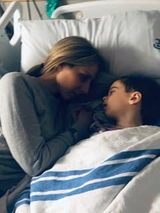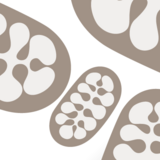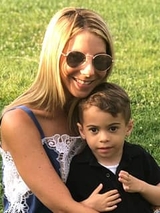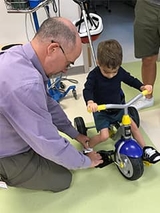Leigh Syndrome: Baron’s Story
Leigh Syndrome: Baron’s Story

An enigma.
That’s how a pediatric developmentalist in New York referred to Baron, then 2, after a year of bloodwork and evaluations. Baron was small — but so were his parents. He wasn’t walking, and he received occupational therapy (OT), physical therapy (PT) and speech therapy. But his bloodwork showed nothing. It wasn’t until a New York geneticist diagnosed Baron with a mitochondrial disease known as Leigh syndrome that the family finally began to get answers.
Baron’s family was referred to Marni Falk, MD, Executive Director of Mitochondrial Medicine at Children’s Hospital of Philadelphia (CHOP). “I was beside myself,” says Baron’s mom, Kim. “I had never heard of Leigh syndrome.”
With twenty questions scribbled on a piece of paper, Kim, along with the rest of Baron’s family — including grandparents — arrived at CHOP for an all-day visit with the Mitochondrial Medicine team. This initial consult involved a variety of tests and exams that ultimately confirmed Baron’s diagnosis.
“My initial reaction was shock,” says Kim. “But I really trust Dr. Falk.”
Leigh syndrome is a complex disorder typically caused by dysfunctional mitochondria — the tiny “batteries” inside cells that generate most of the energy the body’s organs need to function. This impaired cellular energy production can cause patients to experience progressive weakening of many organs, including their muscles, heart and central nervous system.
Because these dysfunctional mitochondria can affect multiple cells in the body and cause a host of medical problems, it was important that all of Baron’s major organs be evaluated. Over the course of the next 10 months, the family traveled from New York to Philadelphia every other week, on what Kim fondly refers to as “the organ tour.”
It was important to Kim and her husband that these bi-weekly trips to CHOP be as fun as possible for Baron. Between appointments with specialists, the family visited the Philadelphia zoo, spent nights in hotels and enjoyed meals in delicious restaurants. “He loves going to Philly,” says Kim, adding that Baron quickly adapted to a life filled with doctors, blood tests and exams. “It breaks my heart, but it makes him stronger, and that drives me.”
While there is currently no cure for mitochondrial disease, CHOP’s world leaders in mitochondrial research are dedicated to advancing treatment options for children with this complex energy deficiency disease. In order to treat the variety of symptoms associated with mitochondrial disease, the multidisciplinary team at Mitochondrial Medicine develops a highly personalized care plan for each patient, which includes specialty care, medication, exercise, optimized nutrition and “mito-cocktails” — an individually tailored set of specific and often compounded medications, vitamins and cofactors designed to combat and stabilize cellular deficits.

More about mitochondrial disease
Mitochondrial disease occurs when dysfunctional mitochondria fail to produce enough energy for cells to function, affecting organ function in any body system.
For Baron, symptoms include growth and developmental delays; brain lesions (referred to as metabolic strokes); gastrointestinal dysmotility (impairment of the speed, strength and coordination of digestive organs); acidemia (high acid levels in the blood); and Jeavons syndrome, (a form of absence seizures that look like staring spells), which began shortly after Baron’s initial diagnosis. With a team of dedicated therapists, medications, supplements and a gastrostomy tube (G-tube) needed to manage his nutritional intake, many of Baron’s symptoms have stabilized. Even with medication, however, his seizures continue to be a problem, at times occurring over 100 times each day and exacerbated by stressors, such as when he feeds himself or tries to hold a pencil. Despite this continued challenge, Baron’s family says he’s doing quite well.

“We’re in a such a good place now,” says Kim, noting that in addition to follow-up appointments with his various specialists, Baron sees Dr. Falk every six months to evaluate his fatigue level, functioning, and physical health, as well as review his labs and tweak his mito-cocktail medications as necessary.
While Baron’s diagnosis has taken a mental and physical toll, Kim says that’s she come to terms with many things and is focused on taking better care of herself so that she can continue to care for her son. “I’ve always given Baron 100 percent, but learned quickly how important it is to take care of myself as well. I need to be okay — physically, mentally and emotionally — in order to give him the care he needs.”

In some ways, Baron is still an enigma. Unlike the typical child with Leigh syndrome, Baron, now 5, is quite active. He loves walking around New York City with his mom, swimming and — before the pandemic — playing with friends on the playground. He takes rests when he needs to, and he isn’t always able to keep up with the other kids. But that doesn’t stop him from having fun. “I want him to know he can do anything,” says Kim.
The family also loves to travel, and it’s important to Kim that Baron experiences as much of life’s beauty as possible. “At the end of the day, life is short for everyone,” she says. “I want him to live and explore and travel. More than anything, I want him to be happy.”
This year, Baron and his parents will be participating in CHOP's Runway, an annual fashion show and fundraising event, to support the hospital’s innovative work for children.
“I feel really taken care of at CHOP,” says Kim. “And I want Baron to know that it’s important for us to give back as much as we can.”